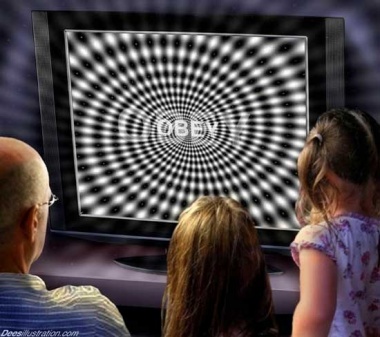Difference between revisions of "Consensus trance"
(reference) |
|||
| Line 1: | Line 1: | ||
{{concept | {{concept | ||
| + | |image=Consensus trance.jpg | ||
| + | |image_width=380px | ||
|description=Probably coined by Richard Heinberg, this phrase indicates a collective agreement not to let objective reality (such as the finite nature of fossil fuels or mendacious behaviour of particular individuals) to impinge on a shared belief system, generally more or less in agreement with the official narrative. | |description=Probably coined by Richard Heinberg, this phrase indicates a collective agreement not to let objective reality (such as the finite nature of fossil fuels or mendacious behaviour of particular individuals) to impinge on a shared belief system, generally more or less in agreement with the official narrative. | ||
|founders=Richard Heinberg | |founders=Richard Heinberg | ||
Revision as of 15:53, 19 December 2014
 | |
| Founder(s) | Richard Heinberg |
| Probably coined by Richard Heinberg, this phrase indicates a collective agreement not to let objective reality (such as the finite nature of fossil fuels or mendacious behaviour of particular individuals) to impinge on a shared belief system, generally more or less in agreement with the official narrative. | |
This term was coined by Richard Heinberg in his writings about 9/11 and Peak Oil. He in turn probably adapted it from Robert Anton Wilson's notion of "Consensus Reality". It refers to the psychology that requires the (possibly tacit) acceptance of the "Official Narrative" through the absorption of sub-conscious blocking out of unpleasant and unpalatable truths about the world, one's country, society, belief system etc., in order to get through the day and concentrate on the deeply establishly routines of life. Remarkably, most people are quite willing to suspend belief in their own senses in order to conform to a group[1].
Contents
Regulating group mind
Canadian academic John McMurtry introduced the roughly equivalent concept of the "regulating group mind" in his 2004 paper, File:Understanding 911 and 911 wars.pdf.
The facts of 9-11 which are disconnected from are now copiously documented. But why and how these facts are ruled out by the masses and elites at the same time is not explained. The argument has been at the first-order level of the facts, not the lawlike operations on the facts by the collective thought-system that selects, ignores and reconnects them in new form - what I call the “regulating group-mind” (RGM). Only when we understand this meta-level of constructing the facts and their meaning in accordance with their conformity to and expression of a pre-existing structure of understanding can we know what is going on or, more specifically, can we find our way out of the anomalies and disconnects of our era.[2]
McMurtry postulates a “regulating group-mind” or socially regulating syntax of thought and judgement which blocks out
- all evidence against its assumptions; and
- the destructive effects which reveal its delusions.
Hemispherical dominance
McMurtry's suggestion has an interesting (and unexplored) connection with the theories of Graham Gynn and Tony Wright about the confabulations of the (life-blind) left-hemisphere of the brain's uncanny ability to deceive itself about its limited comprehension of the facts by confabulation of erroneous explanations for otherwise unexplained events.
Importance
McMurtry underlines the importance of understanding the nature of the regulating group mind, even suggesting:
The RGM may lie behind every systematic social pathology of our era. In each case, it blocks out facts and connections of life-and-death significance, and in each instance, its exclusion is a variation on one life-blind thought regime, the “shadow subject” of our era.[2]
Related Document
| Title | Type | Publication date | Author(s) | Description |
|---|---|---|---|---|
| File:Understanding 911 and 911 wars.pdf | commentary | 30 May 2004 | John McMurtry | A guide to understanding the events of 9-11 and the resulting wars for which it became the casus belli |